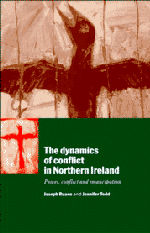Book contents
- Frontmatter
- Contents
- List of figures
- List of tables
- Preface
- 1 Introduction
- 2 Historical formations
- 3 The reconstruction of communal division
- 4 Ideology and conflict
- 5 The dynamics of conflict: politics
- 6 The dynamics of conflict: the economy
- 7 The dynamics of conflict: culture
- 8 The British context of the Northern Ireland conflict
- 9 The Republic of Ireland and the conflict in Northern Ireland
- 10 The international context
- 11 An emancipatory approach to the conflict
- Epilogue
- Appendix
- Bibliography
- Index of names
- Index of subjects
11 - An emancipatory approach to the conflict
Published online by Cambridge University Press: 18 December 2009
- Frontmatter
- Contents
- List of figures
- List of tables
- Preface
- 1 Introduction
- 2 Historical formations
- 3 The reconstruction of communal division
- 4 Ideology and conflict
- 5 The dynamics of conflict: politics
- 6 The dynamics of conflict: the economy
- 7 The dynamics of conflict: culture
- 8 The British context of the Northern Ireland conflict
- 9 The Republic of Ireland and the conflict in Northern Ireland
- 10 The international context
- 11 An emancipatory approach to the conflict
- Epilogue
- Appendix
- Bibliography
- Index of names
- Index of subjects
Summary
Partition did not resolve the historic Irish conflict; it defused it temporarily by accommodating the interests of the two communities in direct proportion to their power. Conflict was suppressed for a time but in 1968–9 re-emerged, concentrated in Northern Ireland but involving the South and the British government. In this final chapter, we draw on our analysis to identify the changing structure of the conflict, to explain why it is continuing and to propose an approach to resolving it.
Partition and its consequences
The source of the pre-partition conflict lay in a system of relationships with three levels (chapter 2). The first consisted of a set of analytically distinct but concretely overlapping dimensions of difference in respect to religion, ethnicity, settler-native status, ideologies of progress and backwardness, and nationality. The second level consisted of a structure of dominance, dependence and inequality involving the British state and Protestants and Catholics in Ireland. The third consisted of tendencies toward communal polarisation around the dimensions of difference. These three levels interlocked, fed back on and mutually reinforced each other. But there was also a dynamic for change. It came from the recovery of power by Catholics and their increasing ability to challenge the system which disadvantaged them. Overt conflict occurred when Catholics pressed for reform or more radical change in the face of Protestant and/or British resistance. The Catholic demand for home rule represented a fundamental challenge to the system as a whole, and it led to partition.
The analysis in this book shows that partition did not mark a new beginning. It led to the territorial restructuring of the historic system of relationships, but did not dissolve it or stifle its dynamic tendencies. First, the dimensions of difference survived intact.
- Type
- Chapter
- Information
- The Dynamics of Conflict in Northern IrelandPower, Conflict and Emancipation, pp. 290 - 316Publisher: Cambridge University PressPrint publication year: 1996



